- Home
- Elif Shafak
The Architect's Apprentice Page 5
The Architect's Apprentice Read online
Page 5
The harem flowed through life in the palace, hidden but forceful. They named it the darussaade – ‘House of Happiness’. Every single one of its rooms and halls was said to be connected to the bedchamber of the Valide, the mother of the Sultan. For years, she and she alone had scrutinized what hundreds of women ate, drank, wore and did every day. Not a cup of coffee was brewed, not a song was chanted, and not a concubine caught the eye of the Sultan without her blessing. The Chief Black Eunuch had been her ears and her eyes. But now she was dead. And all her power, and much more besides, had passed into the hands of the Sultana.
Hurrem was her name, yet many called her witch, zhadi. Of admirers and foes, she had plenty. They said she had put a spell on the Sultan, poisoning his sour-cherry sherbet, sprinkling potions under his pillow, tying his clothes into knots on nights of full moon. Breaking a 300-year-old tradition, the Sultan had married her in a ceremony so lavish it was still the talk in every tavern, brothel and opium den in town. Not that the boy knew anything about taverns, brothels and opium dens, but Sangram did and he loved scattering bits of gossip. Most of Jahan’s knowledge about what was happening inside and outside the palace came from him.
Witch or not, the Sultana had a soft spot for curiosities and went to great lengths to collect them. The tiniest female dwarf in the empire or a musical box with secret compartments; a peasant girl with skin like a lizard’s or a bejewelled dollhouse – she took possession of each one with the same delight. Being fond of birds, she frequently visited the aviary. One parrot there was her favourite – a green-bellied, crimson-winged macaw – and she taught it about a dozen words, which the animal squawked at the top of its ugly voice whenever Sultan Suleiman came close, making him smile. Hurrem enjoyed feeding the gazelles and foals, but she rarely, if ever, spent time with the wild animals. All the better, Jahan thought, for he feared her. How could he not fear a woman who read minds and stole souls?
The first weeks in the payitaht, the ‘Seat of the Throne’, passed by eventlessly. Chota recovered slowly, regaining his weight and good humour. He was given two saddlecloths: one for everyday, yards of blue velvet embroidered with silver thread; and one for festivities, a golden mantle made of heavy brocade. Jahan loved the feel of the needlework on the tips of his fingers. He no longer lamented the precious cloths that Shah Humayun had sent with the elephant, but that Captain Gareth’s sailors had shamelessly plundered on that ominous ship.
At night, as soon as he closed his eyes, his stepfather’s face appeared from out of the gloom. A part of him yearned to return to his village – and kill him. The way he had taken the life of his mother. Kicking her in her belly, even though he knew, for how could he not, that she was pregnant. Another part, a wiser part, whispered he should return but not immediately. After stealing the Sultan’s gems, what harm could there be in saving a few for himself? Captain Gareth would never know. Then he could go home, rich and mighty. His sisters would greet him. Forlorn as they must have been that he had left on a whim, the immensity of their joy upon seeing him again would wipe away their sorrow. Kissing their hands, Jahan would unload the riches at their feet: diamonds, emeralds, jade.
Then, one day, he would come upon a young maiden, pretty as the full moon. Her teeth like pearls, her breasts like ripe quinces, she would walk away from him, but not before honouring him with a furtive smile. He would save her from a terrible danger (drowning or a gang of robbers or a ferocious animal – this part of his dreams always changed). Her lips, when she kissed him, would taste like raindrops, her embrace would be sweeter than honeyed figs. They would fall in love, her caresses washing over him like fragrant waters. So immaculate would be their bliss that, even years after they died of old age in each other’s arms, people would remember them as the happiest couple under God’s sky.
His early days in the menagerie would have been harder were it not for Olev the lion-tamer, who took him under his wing. A man unrivalled in bravery and recklessness but oddly besotted with his moustache, which he combed, waxed and perfumed five times a day. Like Jahan, he had a family waiting for him somewhere – a life he had lost when, at the age of ten, he had been taken by slave traders. His reddish hair, robust build and, especially, his dauntlessness had determined his destiny. Snatched from his family, he was brought to the Ottoman palace, which he was never to leave.
Each morning at dawn the tamers washed their faces in a marble fountain that ran so cold their hands turned raw red. Before noon they shared wheat soup and bread; in the evenings they tucked into rice dripping with sheep’s-tail fat. When darkness fell, they rested their heads on coarse sacks that housed a horde of creeping lice. The nits were everywhere. And fleas. They leaped from animals to humans, from humans to animals. When they bit, which they did often, they left angry marks that swelled into bumps if scratched. Time and again, the tamers examined their animals, the large and the small, scrubbing them with crushed camphor, cardamom and lemongrass. However thoroughly they searched, one flea would always survive. And one flea was all it took.
Twice a week the Chief White Eunuch, who was known to all and sundry as Carnation Kamil Agha, dropped in for an inspection. He never scolded. Never raised his voice. Yet he was one of the most feared men in the palace, his scowl sharper than steel. His skin was so pale that one could see the fine tracery of veins underneath. He had dark circles under his eyes and was said to spend the nights walking the corridors because he could no more sleep than an owl on the hunt. Knowing that the slightest grime was enough to make his hackles rise, the tamers cleaned to no end. They wiped urine off the basins, picked up the faeces, rinsed the feeding cups. Jahan was not sure the animals thought much of this frenzy. Deprived of natural odours – theirs and their mates’ – they got confused about their territories. None of the tamers had the heart to reveal this to the eunuch. Still, they took good care of their animals. Their lives depended on their well-being. When they thrived, so did they; when they fell from favour, so did they.
One day in mid-April a strange thing happened. Jahan was taking Chota back to the barn when he heard a rustle from behind a row of bushes – faint but so close as to give him a start. Pretending not to have noticed anything, he remained alert. Before long, an embroidered silk slipper poked out from under the shrub like a baby snake, unaware of being in the open.
Now that Jahan knew it was a girl hiding there, he racked his brains as to who she could be. There were no females among the tamers. The concubines could not get this far, and certainly not unchaperoned. As he did not wish to scare her, he kept his distance, assuming all she wanted was to see the white elephant up close. So he went on with his work and let her spy on them. She kept coming back – he could hear the crack of twigs beneath her feet, the swish of her robe, always on the sly. By the end of the month Jahan had got used to the mysterious snooper. Such was his acceptance and such her stealth that they would never have spoken to one another had it not been for, of all things, a wasp.
That morning Jahan was cleaning a lump of soil stuck on Chota’s tail when a shriek pierced the air. A girl darted out from behind the hedge, her hair fluttering every which way. Waving her hands, screaming an incomprehensible stream of words, she whisked past them, dashed into the barn and closed the door so harshly it bounced back open.
‘Shoo.’ Jahan grabbed a large leaf and flapped it at the wasp that was chasing her.
Buzzing frantically, the insect circled a few times in frustration and, having tired itself out, steered for the closest rosebush.
‘It’s gone,’ Jahan said.
‘I am coming out. Lower your head, servant.’
She emerged, tall, lithe and reedy. Scrunching up her nose she declared, ‘May Allah forgive me for saying so, but I don’t understand why He would create wasps.’
She walked towards the elephant, curious to see the animal this close. Jahan glanced furtively in her direction, noticing the tiny freckles on her cheeks, the colour of marigold. Her robe of palest green appeared almost white against the sunl
ight, and her wavy hair peeked from beneath her scarf, which she wore loosely.
‘Has my venerable father, his Majesty, seen the beast?’ she asked.
Jahan swallowed, only now realizing with whom he was speaking. He bowed as low as he could. ‘Your Highness Mihrimah.’
The Princess nodded nonchalantly, as if her title were of no interest to her. Her eyes of dark amber slid back to Chota.
‘Would your Excellency like to pat the elephant?’
‘Would it bite?’
Jahan smiled. ‘I can assure your Highness there is only kindness in Chota.’
With a wary look she approached the beast and touched its crinkled skin. In that moment Jahan had another chance to inspect her. He saw a precious necklace with seven milky-white pearls, each larger than a sparrow’s egg. His gaze strayed to her hands. Such delicate hands she had, now raised to her bosom, now nervously clasped. It was this last gesture that got to him: he sensed that, beneath the surface of colours and contrasts, she carried a fretful soul, like his. Otherwise he would never have dared to say what he said next. ‘Humans are frightened of animals but we are cruel, not they. A crocodile or a lion … None of them are as wild as we are.’
‘What a ridiculous thing to say! These are fierce beasts. That’s why we keep them in cages. They would gobble us up.’
‘Your Serene Highness, ever since I came here I have not heard of an animal attacking anyone unless we starved it to death. If we don’t disturb them, they won’t disturb us. But humans are not like that. Whether hungry or not, man is prone to evil. Where would you sleep more peacefully? Next to a stranger with a full belly or next to a well-fed lion?’
She regarded him for a moment. ‘You are a strange boy. How old are you?’
‘Twelve.’
‘I’m older than you,’ she said. ‘I know better.’
Still bowing, Jahan could not help but smile. She had not said the obvious: that she was noble-born and he, a no one. She had said she was older, as though they were, or could someday become, equals. As she turned back on her heel, she demanded, ‘What’s your name?’
He blushed. Somehow saying his name felt awkward, almost intimate. ‘The elephant’s name is Chota, your Highness. Mine is Jahan. But my mother –’
‘What about her?’
This he had not told anyone and didn’t know why he was doing so now, but he said, ‘She named me Hyacinth.’
Mihrimah laughed. ‘What a funny name for a boy!’ Realizing he was offended, she added, more quietly, ‘Why?’
‘When I was born, my eyes were a strange purple. Mother said it was because she had eaten hyacinths while she was heavy with me.’
‘Hyacinth eyes …’ she muttered. ‘And where is your mother now?’
‘No longer in this mortal world, your Highness.’
‘So you are an orphan,’ she said. ‘I feel the same way sometimes.’
‘Your noble parents are alive, may God grant them long life.’
Just then a woman’s voice was heard from behind. ‘I have been looking for you everywhere, Excellency. You really shouldn’t have come here on your own.’
A stocky woman appeared. She had a florid complexion, a penetrating gaze and thin lips pursed in disapproval. Her jawline was strong and sharp, giving the impression of clenched teeth. Without so much as a glance at either the elephant or at the mahout, she marched by as if there were nothing in this vast garden of flowers and animals to rest her gaze upon, even for an instant – save the Princess.
Mihrimah turned to Jahan with an impish delight. ‘My nursemaid,’ she said. ‘Dada is always worried about me.’
‘How can I not worry when my beloved is full of light and the world is so dark?’ the woman said.
Mihrimah laughed. ‘My dada doesn’t like animals, unfortunately. Only one of them. She is fond of her cat, Cardamom.’
A glance was exchanged between them: subtle, elusive and impenetrable. Suddenly Mihrimah seemed troubled. ‘Has My Lady Mother inquired about me?’
‘Indeed, she has. I told her you were in the hamam, taking a bath, your Highness.’
‘Aren’t you my saviour?’ said Mihrimah, smiling. ‘What would I do without you?’ She raised her hand, as if to wave an imaginary handkerchief. ‘Farewell, Chota. Perhaps I’ll come again to see you.’
Thus expressing her good wishes to the elephant, but without a word to the mahout, the Princess, with the nursemaid hard on her heels, strode down the garden path. Jahan was left behind. He stood there for a moment, forgetting where he was and what he was doing. Unasked questions in his mind, a perfume in his nostrils and a jolt in his chest he had never known before.
Jahan thought she would never come again. She did. Along with her smile she brought treats for the elephant – not pears and apples but royal delicacies: figs with clotted cream and violet sherbet, marzipan topped with rose-petal jam or honeyed chestnuts, the last of which, Jahan knew, cost at least four aspers an okka. Whenever the ways of the seraglio displeased or daunted her, she came to see the white beast. She watched Chota in amazement, as if wondering how a creature this mighty could be so docile. The elephant was the Sultan of the menagerie, yet so unlike her own father.
There was no pattern to her visits. At times she wouldn’t be seen for weeks on end and Jahan was left wondering what she was doing in that treasure chest of secrets that was the harem. Then she would appear almost every afternoon. Always, her dada, Hesna Khatun, waited by her side. Always, the nursemaid looked perturbed that the Princess showed such interest in an animal. Though the woman clearly disapproved of Mihrimah’s affection for the elephant, she was also careful to keep it a secret.
A full year passed. Then came a sweltering summer. Jahan was hoarding what little he had pilfered: a silver rosary (from the Chief Gardener), a silk handkerchief with golden embroidery (from a new eunuch), jars of almonds and pistachios (from the royal pantry), a golden ring (from a foreign envoy who had visited the menagerie). He knew they were only knick-knacks, not enough to satisfy Captain Gareth. He had still not been able to learn where they kept the Sultan’s gems, and the truth was, as time went by and he got used to life in the menagerie, he thought less and less about it. He had not heard from Captain Gareth since that day, though the man still appeared in his dreams, a menace who jumped from out of the shadows. Why he had not shown up, Jahan could not fathom. For all he knew he might have gone on a voyage and met a wretched end.
Almost all the words that the Princess and the mahout exchanged were about Chota, who was thriving, expanding in height and weight. Hence Jahan was taken aback when one day, out of the blue, Mihrimah asked him about his life back in Hindustan and how he had ended up here. And this is the story that he told her the next day – she seated under a lilac tree, he on his knees; she observing him, he not daring to glance up; she so close he could smell the scent in her hair, he unable to forget there were worlds between them.
The story the mahout told the Princess
In the great and rich land of Hindustan there lived a poor boy named Jahan. His home was a shack, a stone’s throw away from the road that the soldiers trampled en route to and from Shah Humayun’s palace. He slept under the same roof as his five sisters, his mother and his stepfather, who also was his eldest uncle. Jahan was a curious boy, who loved putting together things with his hands. Mud, wood, stone, dung or twigs, all would be made use of by the boy. Once he built a large furnace in the backyard that pleased his mother immensely, because, unlike anything she had possessed before, it did not emit dark, dizzying smoke.
When Jahan was not yet six his father – for he had once had a father – vanished into thin air. Each time he asked his mother his whereabouts, she gave the same answer: ‘He’s gone by water.’ On board a ship, destined for a city of lights and shadows, far away – where they had another shah or sultan, and treasures beyond imagining.
Another boy would have seen through her fib. Not Jahan. It would take him years to make sense of the fine and flimsy lies
his mother had woven around him, like wispy spider webs, there and not there. Even when his mother was married off to his uncle – a man who constantly sneered at her – the boy refused to accept that his father was not coming back. In helpless anger he watched his uncle sit in his father’s chair, sleep in his father’s bed, chew his father’s betel leaves and not utter a word of gratitude. Nothing his mother did satisfied the man. The fire she lit was not warm enough, the milk she touched curdled, the puris she fried tasted no better than soil, and the body she gave to him every night served no purpose since she still had not gifted him with a son.
When he wasn’t grousing or swearing, his stepfather raised war elephants. He taught these peaceful animals how to charge and to kill. Jahan’s sisters helped him, though never Jahan. Such was the boy’s hatred of his stepfather that he steered clear of the man and his beasts. Except for one – Pakeeza.
A thousand days into her pregnancy, Pakeeza had yet to give birth. Three autumns and three winters had gone by, and it was spring again. The amaltas tree down the road had blossomed gold; the slopes were swathed in wildflowers; snakes had awakened from their darkest sleep – but the baby had not been born. Pakeeza had gained so much weight that she could hardly move. Every day she would mope, her eyelids as heavy as her heart.
Every morning Jahan would bring Pakeeza fresh water and a bucketful of fodder. Laying a hand on her crinkled skin, he would murmur, ‘Maybe today is the big day, huh?’

 Black Milk: On Writing, Motherhood, and the Harem Within
Black Milk: On Writing, Motherhood, and the Harem Within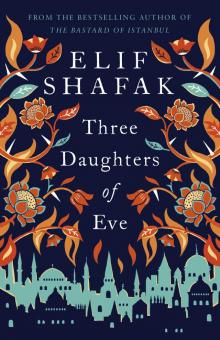 Three Daughters of Eve
Three Daughters of Eve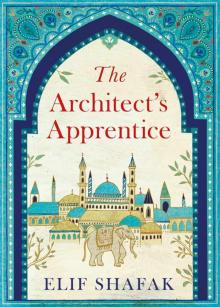 The Architect's Apprentice
The Architect's Apprentice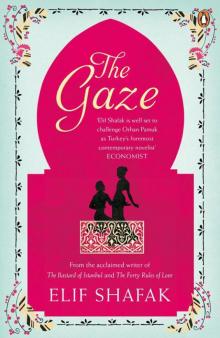 The Gaze
The Gaze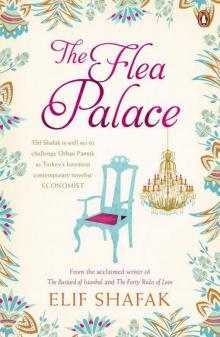 The Flea Palace
The Flea Palace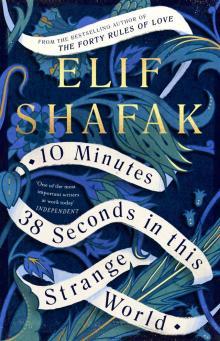 10 Minutes 38 Seconds in this Strange World
10 Minutes 38 Seconds in this Strange World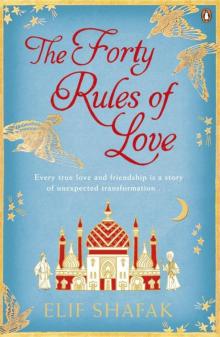 The Forty Rules of Love
The Forty Rules of Love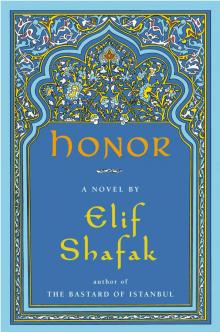 Honor
Honor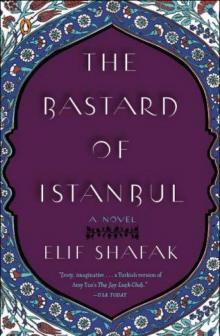 The Bastard of Istanbul
The Bastard of Istanbul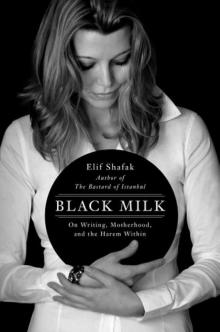 Black Milk
Black Milk The Happiness of Blond People (Penguin Specials)
The Happiness of Blond People (Penguin Specials)